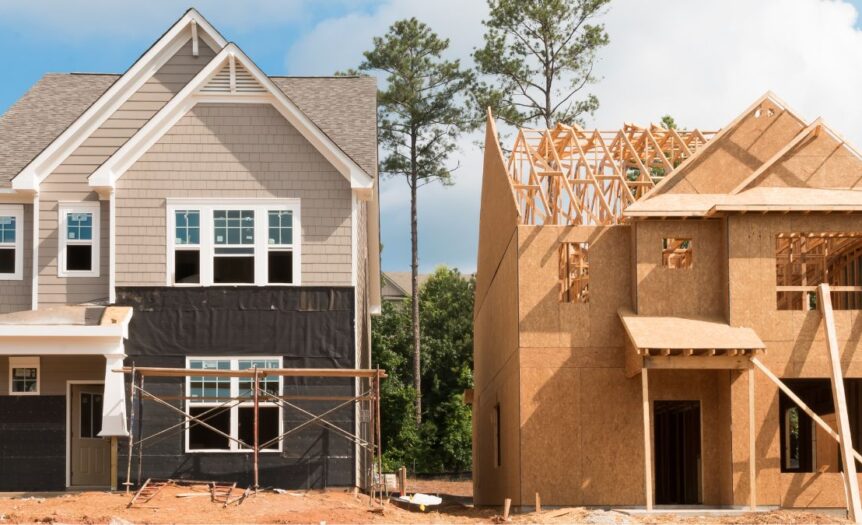In real estate, one of the most significant decisions prospective homebuyers face is whether to invest in an existing home or a new construction project. Both options come with unique advantages and considerations, making this choice a complex one. Check out this home buying guide for existing versus new construction to determine which investment option best suits you and your needs.
The Benefits of Buying an Existing Home
The benefits of buying an existing home are numerous and offer a unique appeal to many homebuyers. One of the most significant advantages is the charm and character that older homes often possess. Existing homes are typically located in established neighborhoods with mature trees, beautiful landscaping, and a strong sense of community. They also have a history and a unique architectural style that adds to their allure. Furthermore, existing homes are sometimes less expensive per square foot, allowing buyers to get more space for their money. Plus, the negotiation process is often more flexible with existing homes, as sellers are eager to move and more willing to compromise on price or terms.
The Advantages of Investing in a New Construction Project
Investing in a new construction project also comes with its own advantages. One of the most enticing benefits is the ability to customize the home to your exact preferences. From the floor plan to the finishes, you have the opportunity to make your home truly your own. New constructions are also built to the latest building codes and standards, guaranteeing a house that’s energy-efficient, environmentally friendly, and equipped with the latest technology. This can translate to lower utility costs and less maintenance in the long run.
Additionally, new construction projects are typically located in newly developed areas, which may offer modern amenities, such as community centers, pools, and walking trails. Finally, new construction projects are generally less impacted by fluctuations in the housing market because their prices are often based on the cost of materials and labor—which are more stable—rather than on supply and demand dynamics. Projects in areas of high growth, especially, offer a higher level of predictability for investors.
Which Is Right for You?
Determining whether to buy an existing home or invest in a new construction project ultimately depends on your personal needs, lifestyle, and financial situation. Your long-term retirement and savings needs are also factors worth considering when buying new construction. A new home can be a significant financial commitment that may limit some of your mobility or future options. However, the comfort and customization that come with a new build are often well worth the investment, particularly for families and retirees seeking a forever home. On the other hand, if you’re drawn to the charm and history of older homes and desire to live in an established neighborhood, an existing home may be a more suitable choice.
Follow this home buying guide on existing houses versus new construction when shopping for a new abode to ensure you pick the ideal option. Whether your dream house is an existing property or a new construction project, consider the pros and cons of each before signing on the dotted line.










 Deering Estate
Deering Estate
 Massage Envy South Miami
Massage Envy South Miami
 Calla Blow Dry
Calla Blow Dry
 My Derma Clinic
My Derma Clinic
 Sushi Maki
Sushi Maki
 Sports Grill
Sports Grill
 The Healthy Kitchen
The Healthy Kitchen
 Golden Rule Seafood
Golden Rule Seafood
 Malanga Cuban Café
Malanga Cuban Café

 Kathleen Ballard
Kathleen Ballard
 Panter, Panter & Sampedro
Panter, Panter & Sampedro
 Vintage Liquors
Vintage Liquors
 The Dog from Ipanema
The Dog from Ipanema
 Rubinstein Family Chiropractic
Rubinstein Family Chiropractic
 Your Pet’s Best
Your Pet’s Best
 Indigo Republic
Indigo Republic




 ATR Luxury Homes
ATR Luxury Homes


 2112 Design Studio
2112 Design Studio
 Hamilton Fox & Company
Hamilton Fox & Company
 Creative Design Services
Creative Design Services
 Best Pest Professionals
Best Pest Professionals
 HD Tree Services
HD Tree Services
 Trinity Air Conditioning Company
Trinity Air Conditioning Company
 Cisca Construction & Development
Cisca Construction & Development
 Mosquito Joe
Mosquito Joe
 Cutler Bay Solar Solutions
Cutler Bay Solar Solutions


 Miami Royal Ballet & Dance
Miami Royal Ballet & Dance
 Christopher Columbus
Christopher Columbus
 Pineview Preschools
Pineview Preschools
 Westminster
Westminster
 Carrollton
Carrollton
 Lil’ Jungle
Lil’ Jungle
 Frost Science Museum
Frost Science Museum
 Palmer Trinity School
Palmer Trinity School
 South Florida Music
South Florida Music
 Pinecrest Orthodontics
Pinecrest Orthodontics
 Dr. Bob Pediatric Dentist
Dr. Bob Pediatric Dentist
 d.pediatrics
d.pediatrics
 South Miami Women’s Health
South Miami Women’s Health

 The Spot Barbershop
The Spot Barbershop
 My Derma Clinic
My Derma Clinic




 Miami Dance Project
Miami Dance Project

 Rubinstein Family Chiropractic
Rubinstein Family Chiropractic
 Indigo Republic
Indigo Republic

 Safes Universe
Safes Universe
 Vintage Liquors
Vintage Liquors
 Evenings Delight
Evenings Delight





 Atchana’s Homegrown Thai
Atchana’s Homegrown Thai
 Baptist Health South Florida
Baptist Health South Florida

 Laser Eye Center of Miami
Laser Eye Center of Miami
 Visiting Angels
Visiting Angels
 OpusCare of South Florida
OpusCare of South Florida

 Your Pet’s Best
Your Pet’s Best





 HD Tree Services
HD Tree Services
 Hamilton Fox & Company
Hamilton Fox & Company


 Creative Design Services
Creative Design Services